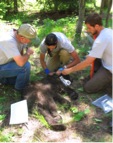Payette Brewing Company in Boise, Idaho, has been contributing spent grain to the Idaho Department of Fish and Game to help them trap bears to tag and collar for scientific purposes. In this update, Katie Oelrich of Fish & Game shares the story of how Payette’s spent grains are used and what the trappings mean for the department.
Payette Brewing Company and Idaho Department of Fish and Game: Not the typical pairing!
Black bears are appreciated by many as an important species in the ecosystem, and are an iconic big game species in Idaho. The Idaho Department of Fish and Game captures black bears as a part of a research project in the Boise Nation Forest. The purpose of the project is to monitor black bear population health. We determine population abundance, habitat use, survival and cub production.
In the summers of 2012 and 2013, we were blessed by the donation of used beer mash by Payette Brewing Company. Now you’re probably wondering, how does beer mash help monitor black bears. We use it to catch them. Bears have a superb sense of smell and once they come out of the den all they’re focused on is finding food.
Beer mash and other rotting goodies are used to lure the animals into the leg hold snare traps. Once caught, we radio collar, mark and examine the health, age and breeding status of the bear. In the winter, we locate the radio collared-bears in the dens with fixed-winged airplane flights and ground radio telemetry. Once the dens are located, we begin our den surveys. During these surveys we examine the bears overall health, whether it produced cubs, if yearling bears survived and the condition of the radio collar. We also get an idea of the type of habitat bears chooses to den in.
Our agencies have a lot in common; we care about the wildlife in our state and supporting each other in the community! Thank you Payette Brewing Company!
Katie Oelrich, Idaho Department of Fish and Game, Southwest RegionWildlife Research Biologist

Share Post